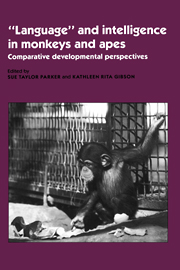Book contents
- Frontmatter
- Contents
- List of contributors
- Foreword
- Preface
- Acknowledgments
- Part I Theoretical frameworks for comparative developmental studies
- Part II Comparative developmental perspectives on cebus intelligence
- 5 The comparative study of cognitive ontogeny in four primate species
- 6 Sensorimotor development in hand-reared and mother-reared tufted capuchins: A systems perspective on the contrasts
- 7 Tool use, imitation, and deception in a captive cebus monkey
- 8 The role of innate motor patterns in ontogenetic and experiential development of intelligent use of sticks in cebus monkeys
- Part III Questions regarding imitation, “language,” and cultural transmission in apes and monkeys
- Part IV Developmental perspectives on social intelligence and communication in great apes
- Part V Development of numerical and classificatory abilities in chimpanzees and other vertebrates
- Part VI Comparative developmental perspectives on ape “language”
- Index
6 - Sensorimotor development in hand-reared and mother-reared tufted capuchins: A systems perspective on the contrasts
Published online by Cambridge University Press: 11 May 2010
- Frontmatter
- Contents
- List of contributors
- Foreword
- Preface
- Acknowledgments
- Part I Theoretical frameworks for comparative developmental studies
- Part II Comparative developmental perspectives on cebus intelligence
- 5 The comparative study of cognitive ontogeny in four primate species
- 6 Sensorimotor development in hand-reared and mother-reared tufted capuchins: A systems perspective on the contrasts
- 7 Tool use, imitation, and deception in a captive cebus monkey
- 8 The role of innate motor patterns in ontogenetic and experiential development of intelligent use of sticks in cebus monkeys
- Part III Questions regarding imitation, “language,” and cultural transmission in apes and monkeys
- Part IV Developmental perspectives on social intelligence and communication in great apes
- Part V Development of numerical and classificatory abilities in chimpanzees and other vertebrates
- Part VI Comparative developmental perspectives on ape “language”
- Index
Summary
Introduction
Sensorimotor development occupies a special place in cognitive developmental theory. Infants' experiences through their motor activity in the first year or so of life are believed to contribute to their initial understanding of the physical world (e.g., Case, 1985). For this reason, sensorimotor development and cognitive development are inextricably related. Sensorimotor development holds an even greater significance for those using a cognitive approach derived from Piagetian theory in developmental studies of nonhumans, because only the first, sensorimotor period of cognitive development in the Piagetian scheme can be examined across species (e.g., Antinucci, 1989). In this chapter, I identify some limitations of a cognitively oriented approach to the comparative study of sensorimotor development. I also describe an alternative theoretical framework that I anticipate will better enable us to focus on the process of development, which many authors have urged (e.g., Fentress, 1984; Hinde & Bateson, 1984). The alternative framework, drawn from dynamical systems theory, is in a nascent stage, but I believe it holds great promise for comparative developmental studies.
A dynamical systems perspective allows us to examine the changing relations among elements in a system (say, walking) during development and the synchronic and diachronic links between the focal system and other systems (e.g., Fentress, 1986; Fentress & McLeod, 1986; Thelen, in press; Thelen, Kelso, & Fogel, 1987; Trevarthen, 1984a,b; Wolff, 1987).
Information
- Type
- Chapter
- Information
- 'Language' and Intelligence in Monkeys and ApesComparative Developmental Perspectives, pp. 172 - 204Publisher: Cambridge University PressPrint publication year: 1990
Accessibility standard: Unknown
Why this information is here
This section outlines the accessibility features of this content - including support for screen readers, full keyboard navigation and high-contrast display options. This may not be relevant for you.Accessibility Information
- 1
- Cited by
